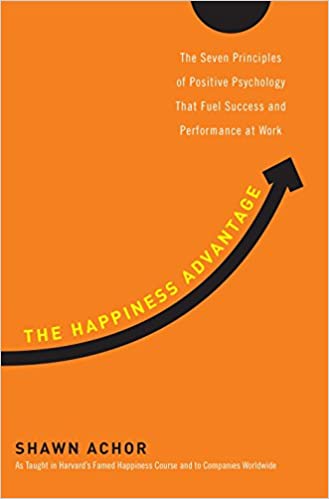INSIDER: The Happiness Advantage
Jacob Brenton, MDiv/MBA
 If you were to hear the term “positive psychology,” what ideas come to mind? Unrealistic optimism? Self-esteem exercises? Though these misconceptions are hard to shake, Harvard University instructor Shawn Achor condenses his years of positive psychology research in The Happiness Advantage to encourage readers that positive change is possible by changing perspective. Achor is a Waco, Texas native known for his Ted Talk on happiness and teaching the Harvard course on happiness. Because his research on positive psychology hit as the 2008 recession took effect, he has now spent years tailoring his findings for the business community.
If you were to hear the term “positive psychology,” what ideas come to mind? Unrealistic optimism? Self-esteem exercises? Though these misconceptions are hard to shake, Harvard University instructor Shawn Achor condenses his years of positive psychology research in The Happiness Advantage to encourage readers that positive change is possible by changing perspective. Achor is a Waco, Texas native known for his Ted Talk on happiness and teaching the Harvard course on happiness. Because his research on positive psychology hit as the 2008 recession took effect, he has now spent years tailoring his findings for the business community.
Achor summarizes his findings into seven principles: a summary of the increased productivity of happier people, the benefits of leveraging happiness, finding opportunity, capitalizing on failures, controlling areas we can impact, setting ourselves up for success, and perhaps most importantly, creating a social support network. Distilling Achor’s points down even further, four central themes can be gleaned to harness the author’s proposed “happiness advantage.”
THINK POINT #1: Happiness Works
Before continuing, we should understand Achor’s definition of happiness. The author adopts the same three-fold definition of happiness his predecessor in the field, Martin Seligman, used: heightened pleasure, engagement, and meaning. Note that this is not an encouragement toward the flippant and exclusive pursuit of pleasure. Instead, Achor recognizes that pleasure is but one pursuit in happiness, alongside engagement in work and finding meaning in the world.
Achor’s research, alongside the field of positive psychology, yields surprising results. Those who exhibit a life marked by pleasure, engagement, and meaning aren’t just more satisfied in their personal lives, but they also demonstrate higher productivity, fewer sick days, and change careers less often. Though traditional wisdom might suggest seeking happiness is a diversion from productivity, the author sites multiple studies showing that employees make better decisions faster when they are happy.
Having fun at work and infusing tasks with engagement isn’t just more pleasurable for employees, it correlates with better outcomes and helps the corporate bottom line. The correlation is compelling, but how will you apply this competitive advantage of happiness to your life? Achor insists that for most people, a naturally happy disposition is not the norm, but that attitudinal change is possible. The rest of Achor’s book focuses on the kind of practices we can use to build a professional and personal life that pursues a happiness advantage.
THINK POINT #2: Dealing with Failure
One major practice Achor recommends is examining how we deal with failure. The author starts with simply acknowledging that failure will happen. No positive disposition will prevent all business failures, nor should we expect it to. The difference is that happier people will deal better with their failure. When we encounter failure, we often either retreat from the problem or spend inordinate time circling around it and emphasizing our perceived weaknesses. Sometimes though, in failure, we find a new opportunity for growth.
This growth path is, of course, the most difficult path to find in that moment, so Achor encourages readers to instill a habit of looking for upward opportunities. Managers must work to cast failure as an iteration on the process toward success. It is in casting this opportunity culture then that employees begin to try their more creative solutions. Will many of these innovations fail? Of course. But amid this failure, some of these ideas will succeed, because employees were brave enough to try.
One helpful tool in instilling an opportunity culture is understanding our explanatory style. When you encounter a setback, how do you explain it in your mind? Do you find a positive angle while reassuring yourself it could have been worse? Or do you focus on the problem and wish it had happened to someone else? How you explain your problems and your challenges is important. The goal here is not to ignore problems or gloss over the tough road ahead. Rather, the goal is that the stories and explanations we tell ourselves find the opportunities and the more positive results from the failure.
THINK POINT #3: Goals and Setting Yourself up for Success
As a real estate professional, many things are out of your control: other agents, fickle buyers, difficult markets, etc. Some of your job tasks inherently necessitate putting out fires you did not start. Achor asks us, though, to focus continually on what we can control. The focus then is not on feeling helpless or overwhelmed, but rather, on our strengths and the areas we can change. As we begin to see changes in this closely held area, we can start to do more to impact the areas we inhabit.
As we consider our own little spheres of influence, the tried and true concept of setting attainable goals comes into view. Especially in the corporate world, goals are often set as part of a checklist, filed away and never revisited until the annual review. To help us achieve these goals, the author suggests a simple model of integrating habits into our daily life, which put the goals in our line of sight. If we build barriers to keep us from breaking our best intentions, we have already begun the process of growing toward our goals. For example, falling asleep in your gym clothes so that you can work out in the morning or removing the batteries from your remote so you watch less TV can be practical ways to meet your personal goals. If we set up situations for success, we may find ourselves happier in life, leading to more positive outcomes.
THINK POINT #4: Social Support Networks
These days, we are busier, more stressed, and less connected to humanity than ever before. Our in-person communal spaces are less popular, so we attempt to fill that void with social media. Achor contends that there is no substitute for a support network of people we know in person. People who have a community of others with whom they might experience successes and failures are inevitably happier than those who do not have this vital community. Of course, this does not mean that all introverted people must suddenly become outgoing socialites. Just having a few people “in your corner” has proven to improve quality of life, career success, and overall happiness.
As a real estate professional, you are likely already better at recognizing and fostering community than many others. You are involved in selling physical assets in real communities to real people. How can you go further, though, in understanding the social support networks which underlie your work, and what networks might need to be strengthened? For example, how well do you know the social community of the areas in which you work? Beyond the local schools and proximity to a park, are you able to tell buyers what the neighbors in this area are like?
 Perhaps more importantly, are you helping to foster an appropriate professional social support network at the office? You and your coworkers need one another to help cope with the challenges of today’s complex business environment. Beyond viewing one another as business assets, we should work to foster environments of care and concern for each other. While there are certain personal boundaries we should not cross in the professional environment, the point remains—offices that connect over the coffee pot and lunch break produce more successful and happier employees.
Perhaps more importantly, are you helping to foster an appropriate professional social support network at the office? You and your coworkers need one another to help cope with the challenges of today’s complex business environment. Beyond viewing one another as business assets, we should work to foster environments of care and concern for each other. While there are certain personal boundaries we should not cross in the professional environment, the point remains—offices that connect over the coffee pot and lunch break produce more successful and happier employees.
Conclusion
In considering how to apply more positive practices to your life, these suggestions may seem obvious. Achor encourages us to get out and start living them. The author acknowledges that while the research he presents puts hard numbers to these concepts, he’s not suggesting much that hasn’t already been suggested. But rather, the key to living into happiness is carrying out the things we know we should be doing.
Perhaps the simplicity of these practices is their great strength. Nothing Achor recommends is a closely guarded secret or hard to implement—but living into a happier life takes work. Dedication. Faith. If we are to move beyond solely focusing on fleeting pleasures toward a deeper engagement with meaning, we need to put work into capitalizing on the normal failures in our life. We need to set our goals and master our own spheres of influence, before reaching into the world. We need to invest time and effort into others who care about us. Perhaps then, we can find the happiness advantage Achor promises.
. . . . . . . . . . . . . . . . . . .
Recommended Reading
Achor, Shawn (2010), The Happiness Advantage: The Seven Principles of Positive Psychology That Fuel Success and Performance at Work, Currency: New York.
. . . . . . . . . . . . . . . . . . .
About the Author
Jacob Brenton, MDiv/MBA
Baylor University
Jacob Brenton graduated with his Master of Divinity/Master of Business Administration from Baylor University in 2020. He earned his Bachelor of Science in Computer Graphic Design from the McLane College of Business at the University of Mary Hardin-Baylor in 2014 and then worked in a non-profit before returning to school. Jacob enjoys studying the intersections of faith, business, ethics, and technology, and he currently serves as Acting Interim Pastor of St. John United Church of Christ in Robinson, Texas.